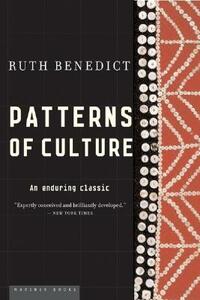Take a photo of a barcode or cover
challenging
informative
slow-paced
I was surprised when I learned it was written in the early 1920s! Definitely some problem areas, but still quite resonant with today etc.
informative
medium-paced
The last chapter is a great read especially when you consider when this is written. The bulk of the book is the description of three cultures which is interesting but I suspect highly disputed today.
A timeless, well written classic and Benedict's quintessential opus Patterns of Culture is quite dated nowadays but still a great insight into the minds of one of the great anthropologists of the 20th century and her theory of cultures.
Read for school. Had some good discussions about how in a modern perspective Benedict's narrative can be problematic, but this was a very enjoyable read. I'll be looking for her that book.
A colleague of mine - a self-described ethnography enthusiast - lent me this book, describing it as a foundational text in anthropology, specifically of the culture and personality approach. Now, I must admit that I initially approached this book as assigned reading. I thought it would be interesting intellectually, but still feel like homework, you know?
But I quickly found that I loved not only the ideas Ruth Benedict puts across, but the way she does. Her writing is so erudite and eloquent, and full of metaphors and analogies that make the content anything but dry. If Charles Darwin famously said of his theory of evolution, "There is grandeur in this view of life," I think you might say of this monograph that there is kindness and openness.
I read this cover to cover and must agree that it is still relevant today. Would recommend.
But I quickly found that I loved not only the ideas Ruth Benedict puts across, but the way she does. Her writing is so erudite and eloquent, and full of metaphors and analogies that make the content anything but dry. If Charles Darwin famously said of his theory of evolution, "There is grandeur in this view of life," I think you might say of this monograph that there is kindness and openness.
I read this cover to cover and must agree that it is still relevant today. Would recommend.
Patterns of Culture is a seminal work in the field of Anthropology, written in 1936 by Ruth Benedict, the Columbia University Professor of Anthropology, student of Franz Boas and mentor of the famous anthropologist Margaret Mead. In fact, Margaret Mead wrote the preface to Patterns of Culture.
This book is a study of three diverse cultures - the Zuni indians of the American Southwest, another tribe of the Pacific Northwest and a people of the Pacific Islands of Micronesia. In this work, Benedict describes these peoples using classifications that she borrowed from the German philosopher Friedrich Nietzche. There are "Apollonian" cultures, formal, staid and unexciting, and then there are the "Dionysian" cultures, wild, violent and uninhibited. Of the three cultures examined by Benedict, only the Zuni were Apollonian. Part of Benedict's thesis seems to be that wild and uninhibited behaviors among the Dionysian cultures are the reason why these societies never progress beyond the point of being savages.
It is interesting to note that, prior to the 1960s, social science was largely in the service of Darwinian and Nietzchian theories of Survival of the Fittest and the "Ubermensch", the idea that some men are better than others. Benedict does not espouse these views in her book, but between the lines we can see their implicit acceptance. While Benedict does state that cultures should be assessed on their own merits and not compared to other cultures or valued in this way, she does judge the various cultures in her analysis of their situations. Perhaps we can say that it is impossible as human beings to not judge each other.
I would be interested to know if anthropology students still read this work and other early works in their field. My suspicion is that they do not, and that they know of the analysis presented here through a paragraph or two that are devoted to Benedict in their Anthropology text. It would be a shame if this were the case. One of our vices in the 21st century is an ignorance of the history and development of science. Even works published as recently as the 1930s are known today only through commentary.
This book is a study of three diverse cultures - the Zuni indians of the American Southwest, another tribe of the Pacific Northwest and a people of the Pacific Islands of Micronesia. In this work, Benedict describes these peoples using classifications that she borrowed from the German philosopher Friedrich Nietzche. There are "Apollonian" cultures, formal, staid and unexciting, and then there are the "Dionysian" cultures, wild, violent and uninhibited. Of the three cultures examined by Benedict, only the Zuni were Apollonian. Part of Benedict's thesis seems to be that wild and uninhibited behaviors among the Dionysian cultures are the reason why these societies never progress beyond the point of being savages.
It is interesting to note that, prior to the 1960s, social science was largely in the service of Darwinian and Nietzchian theories of Survival of the Fittest and the "Ubermensch", the idea that some men are better than others. Benedict does not espouse these views in her book, but between the lines we can see their implicit acceptance. While Benedict does state that cultures should be assessed on their own merits and not compared to other cultures or valued in this way, she does judge the various cultures in her analysis of their situations. Perhaps we can say that it is impossible as human beings to not judge each other.
I would be interested to know if anthropology students still read this work and other early works in their field. My suspicion is that they do not, and that they know of the analysis presented here through a paragraph or two that are devoted to Benedict in their Anthropology text. It would be a shame if this were the case. One of our vices in the 21st century is an ignorance of the history and development of science. Even works published as recently as the 1930s are known today only through commentary.
I think Benedict makes some interesting points. She has written a book that covers almost exactly the reasons I want to study anthropology. She wants people to understand the idea of cultural relativity, which I think is an important idea. We have to remember that every culture is different and people fit into their cultures and worlds differently. Just because I am a white woman in the US doesn't mean I understand the experience of every white woman in the US. We are all different and we fit into this world as an outsider to one culture but as a normal citizen of another culture. Culture is a ever changing thing that I think is so interesting and will truly never be fully understood.
Také to, keď si vyberiete knihu podľa pekného obalu a ona je fakt dobrá. Áno, je to jedno zo základných diel antropológie. Ale písané tak zaujímavo, že baví aj totálneho laika.




